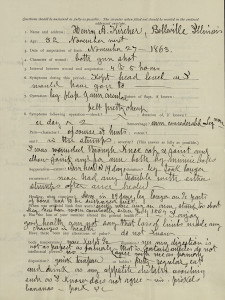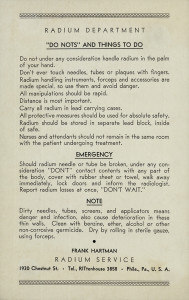I have been involved with National History Day (NHD) since 2001 as both a judge and as a librarian. Judging this competition is exciting – middle and high school students put their heart and soul into projects, some of which are of exceptional caliber. Working with NHD as a librarian can be frustrating – students seem to stick with the same 10 broad topics, all of which can be researched with little more than a few clicks on Google.
I am going to tell students a deep, dark secret held closely by NHD judges: if we, the judges, read another paper, or see another exhibition, about the atomic bomb, or about the Salem witch trials, or about Alice Paul, we might start screaming. The impact of the atomic bomb on international relations, or the impact of the trials on the development of government in New England, or Paul’s impact on women’s suffrage cannot be denied. However, I’ve read a paper each year since 2001 about the atomic bomb, regardless of the annual theme of NHD, papers with bibliographies that are created using nothing but sources that are found online.
The most exceptional projects that I have judged at the regional and national levels have examined local history. All of them began with a student looking at local newspapers, or letters, or diaries who then asked, “Why?” or “How?” Why did an ardent Democrat and supporter of states’ rights, a man who loathed Abraham Lincoln, sponsor and lead a regiment that fought for the Union during the Civil War, a regiment from which came a Medal of Honor winner? How did Quaker philosophy influence the development of prisons and criminal justice in colonial Pennsylvania?
Students who live in the greater Philadelphia area are surrounded by a wealth of libraries and archives that document local history, history that often had an impact beyond Philadelphia. My library, the Historical Medical Library of The College of Physicians of Philadelphia (HML), documents not only the history of medicine, but also a group of dedicated physicians whose work here in Philadelphia had impact beyond the immediate area. How did Dr. S. Weir Mitchell’s experiences with amputees as a physician during the Civil War influence his creation of one of the first longitudinal studies in the history of medicine? How did Dr. James M. Anders support public health initiatives in Philadelphia, and what did those initiatives do to improve the quality of life in the city? What was Dr. Robert Abbe’s role in bringing radium to the United States for use as a medical treatment? How did the medical establishment react to the outbreak of influenza in Philadelphia in 1918?
To help students explore potential topics for National History Day, as well as for other school projects, the HML has created a “Student Resources” page that provides information about using the collections. This page also provides access to a growing list of topics and resources that can help guide student research.
The Library is usually open to researchers by appointment only Tuesday through Thursday from 10:00am – 4:00pm. To help young scholars, the Library will have special Saturday hours on January 16, 2016 and February 6, 2016 from 10:00an – 1:00pm. Access will be appointment only. To inquire about how to access the collections, please contact us at library@collegeofphysicians.org.
Students, if you want to stand out, if you want your work to be recognized, if you want to compete at the state or national level, remember a few important things: present on a topic that few other students have examined; use primary sources that aren’t always found online; and reach out to local libraries and archives for advice and great resources.



